牛津上海版英语八年级上册 Unit6 Nobody wins (Ⅰ) 讲义
文档属性
| 名称 | 牛津上海版英语八年级上册 Unit6 Nobody wins (Ⅰ) 讲义 |
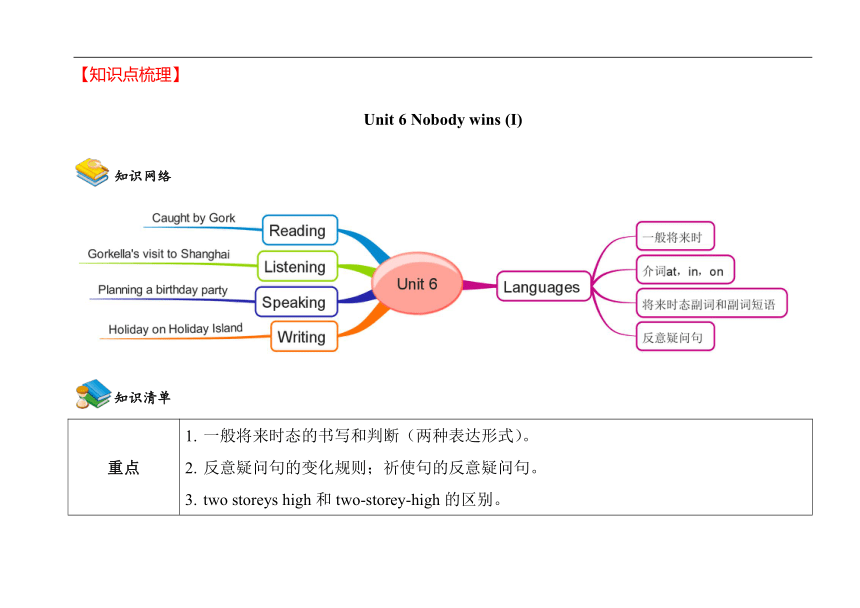
|
|
| 格式 | docx | ||
| 文件大小 | 238.7KB | ||
| 资源类型 | 教案 | ||
| 版本资源 | 牛津上海版(试用本) | ||
| 科目 | 英语 | ||
| 更新时间 | 2022-08-26 16:45:34 | ||
图片预览

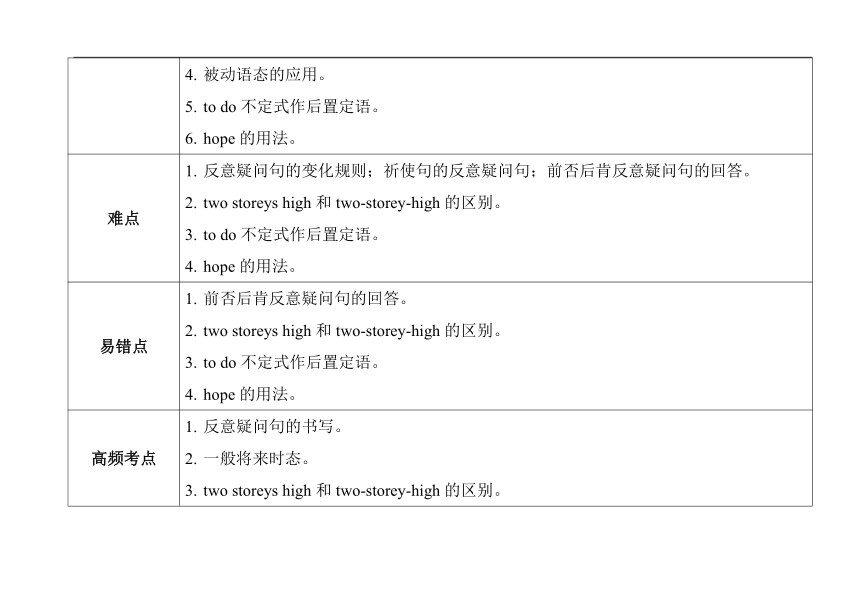
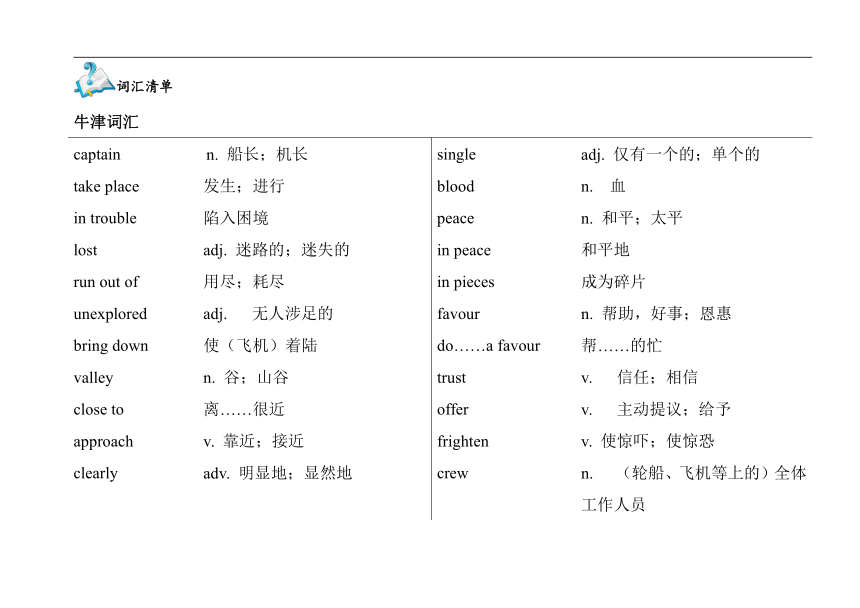
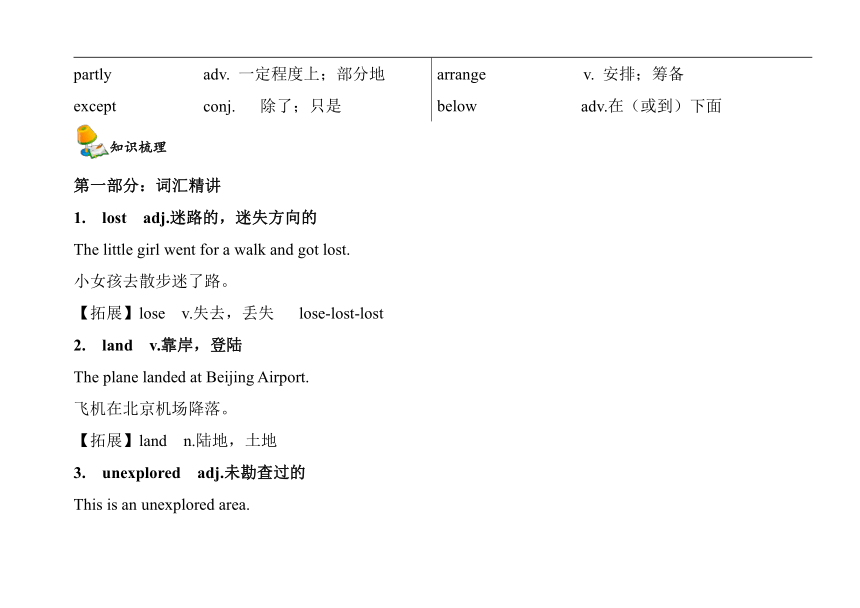
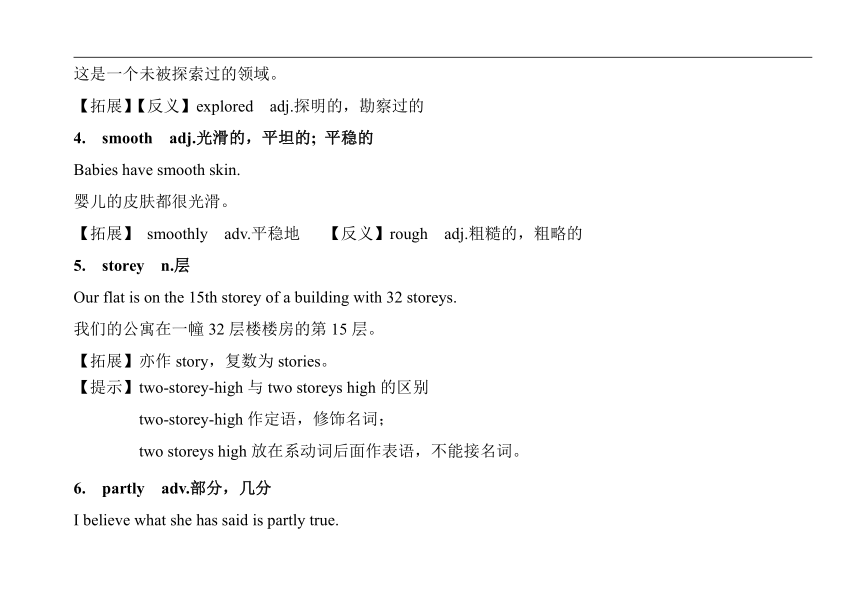
文档简介
【知识点梳理】
Unit 6 Nobody wins (Ⅰ)
重点 一般将来时态的书写和判断(两种表达形式)。 反意疑问句的变化规则;祈使句的反意疑问句。 two storeys high和two-storey-high的区别。 被动语态的应用。 to do不定式作后置定语。 hope的用法。
难点 反意疑问句的变化规则;祈使句的反意疑问句;前否后肯反意疑问句的回答。 two storeys high和two-storey-high的区别。 to do不定式作后置定语。 hope的用法。
易错点 前否后肯反意疑问句的回答。 two storeys high和two-storey-high的区别。 to do不定式作后置定语。 hope的用法。
高频考点 反意疑问句的书写。 一般将来时态。 two storeys high和two-storey-high的区别。
牛津词汇
captain n. 船长;机长 single adj. 仅有一个的;单个的
take place 发生;进行 blood n. 血
in trouble 陷入困境 peace n. 和平;太平
lost adj. 迷路的;迷失的 in peace 和平地
run out of 用尽;耗尽 in pieces 成为碎片
unexplored adj. 无人涉足的 favour n. 帮助,好事;恩惠
bring down 使(飞机)着陆 do……a favour 帮……的忙
valley n. 谷;山谷 trust v. 信任;相信
close to 离……很近 offer v. 主动提议;给予
approach v. 靠近;接近 frighten v. 使惊吓;使惊恐
clearly adv. 明显地;显然地 crew n. (轮船、飞机等上的)全体工作人员
partly adv. 一定程度上;部分地 arrange v. 安排;筹备
except conj. 除了;只是 below adv.在(或到)下面
第一部分:词汇精讲
1. lost adj.迷路的,迷失方向的
The little girl went for a walk and got lost.
小女孩去散步迷了路。
【拓展】lose v.失去,丢失 lose-lost-lost
2. land v.靠岸,登陆
The plane landed at Beijing Airport.
飞机在北京机场降落。
【拓展】land n.陆地,土地
3. unexplored adj.未勘查过的
This is an unexplored area.
这是一个未被探索过的领域。
【拓展】【反义】explored adj.探明的,勘察过的
4. smooth adj.光滑的,平坦的; 平稳的
Babies have smooth skin.
婴儿的皮肤都很光滑。
【拓展】 smoothly adv.平稳地 【反义】rough adj.粗糙的,粗略的
5. storey n.层
Our flat is on the 15th storey of a building with 32 storeys.
我们的公寓在一幢32层楼楼房的第15层。
【拓展】亦作story,复数为stories。
【提示】two-storey-high与two storeys high的区别
two-storey-high作定语,修饰名词;
two storeys high放在系动词后面作表语,不能接名词。
6. partly adv.部分,几分
I believe what she has said is partly true.
我相信她刚才说的话一部分是真实的。
【拓展】 part adj.部分的,局部的 n.部分
7. true adj.正确的,真实的;真正的
A true friend will always help you.
真正的朋友一定会有难相助的。
【知识拓展】 truly adv.真正地 truth n.事实 【词组】come true (指希望) 实现
【提示】老师在授课要注意提醒学生true和real的区别,在前面单元已经解释过。
8. peace n.和平, 和睦, 安宁,宁静,平静
All I want is some peace and quiet.
我所需要的就是一点安宁和清静。
【拓展】peaceful adj.和平地
【提示】可以给学生讲解一下peace和piece的区别,避免发生混淆。
9. favour n.善意的行为,恩惠
Will you do me a favour and phone for me
你能否帮个忙给我打个电话?
【拓展】in favour of赞成,支持
10. except prep.除了……之外
【比较】except, besides, except for except表示“除……之外”,有排他的含义; He gets up early everyday except Sunday. besides表示“除……还有……”,有附加的含义。 They all get up early besides John. except for表示“除开”的部分与其他事物通常不是同类,而except则为同类事物。 This article is easy to understand except for some idiomatic expressions.
第二部分:重点句型
1. In the cliff there were doors-each two storeys high!只见悬崖上有些门,每扇都有两层楼高。
=In the cliff there were two-storey-high doors.
two-storey-high这类合成的形容词一般用作定语修饰名词,不用作表语。
【对比】Mary is a twelve-year-old girl.=Mary is twelve years old.
玛丽是一个12岁的女孩。
【提示】当数词与单位名词一起用作定语时,单位名词往往用单数形式,数词与单位名词用“-”连接。
a two-hour plan一个2小时的计划
a three-foot-high desk一张3英尺高的课桌
400-metre race 400米跑
2. Tomorrow, you'll be the last one to die. 明天,你会是最后一个死的。
the last one to die中to die是不定式作定语,修饰the last one,解释为“最后一个死的”。如:
Mary is always the first to come and the last to leave.
玛莉经常第一个到最后一个走。
This is a good chance to practice your English.
这是你练习英语的好机会。
【提示】作定语的不定式与被它修饰的名词或代词之间常存在主谓或动宾关系,而其中表示动作发生的地点、使用的工具时,不定式后常加一个介词。
We haven't decided which hotel to stay at.
我们还没决定待在哪一家宾馆。
I'm hungry. Give me something to eat.
我很饿,给我一些东西吃。
【拓展】不定式在句中的作用
①作主语,但为了保持句子平衡,常用it作形式主语。
To dance is a lot of fun. =It is a lot of fun to dance.
跳舞非常有趣。
To speak English is not easy for me. =It is not easy for me to speak English.
说英语对我来说并不容易。
②作表语
My dream is to be a teacher.
我的梦想是成为一名老师。
The best plan is to leave here at once.
最好的计划就是马上离开这儿。
③作宾语
He wanted to buy a computer.
他想买一台电脑。
She likes to play football.
她喜欢踢足球。
④作宾语补足语
She asked me to speak more loudly.
她要求我再大声点儿说。
Lucy told him not to cry.
露西告诉他不要哭了。
⑤作状语
Tom came to see me last night.
昨天晚上汤姆来看我。
I am glad to see you.
很高兴见到你。
第三部分:语法点拨
1. 一般将来时
一般将来时主要表示将来发生的动作或情况。一般将来时的表示方法主要有以下两种:
(1) will/shall+v.(原形)(现在一般用will代替shall)
My family will have our dinner at 7 p.m.
我们家会在七点钟吃晚饭。
I will prepare for the English exam.
我会准备英语考试的。
(2) be(am, is, are) going to+v.(原形),表示现在计划好将来要做的事或将来可能发生的事,突出主观意图。
I'm going to write to Mary this evening.
今晚我要写信给玛莉。(计划要做的事)
Look at the dark clouds. There is going to be a storm.
看那些乌云,暴风雨就要来了。(有迹象要发生的)
【提示】
1)be going to不能单纯表示将来(自然趋势或必然结果)
I am going to be twenty next year.(误)
I shall be twenty next year. 我明年就要20岁了。(正)
Tomorrow is going to be the 20th of September.(误)
Tomorrow will be the 20th of September. 明天9月20号。(正)
2)意为“意图”“打算”“安排”等时,常用现在进行时表将来,常用的词为come,go,start,arrive,leave,stay等。
He is leaving tomorrow.
他明天要走了。
Are you staying here till next week
你会一直待到下个星期吗?
I'm going to Shanghai Museum this Sunday.
星期日我要去上海博物馆。
He is coming to visit us this afternoon.
今天下午他要来看我们。
3)在时间状语从句及条件状语从句中,主句若为一般将来时,则从句要用一般现在时代替将来时。
I will tell you everything as soon as I get home.
我一到家就会告诉你所有的一切。
If you tell me, I will keep it a secret.
如果你告诉我,我会保密的。
【记忆】
一般将来时表示将要发生的情况或动作,常与表示将来的时间状语tomorrow,next month,soon,in a week等连用。句型为will+v. (原形)或 am(is,are) going to+v.(原形)。
2. 介词:at, on, in
(1) 在以next, last, this引起的时间状语及tomorrow, tonight, yesterday, the day after tomorrow,...ago等时间状语前一般不加介词。
(2) at通常用于:
确切的时间: at 7:30, at a quarter past six
用餐时间:at lunch time
表示在一段节日期间:at Christmas
固定词组搭配:at dawn, at night, at midnight, at noon, at that time, at the moment
(3) on通常用于:
确定某天的某段时间:on the evening of May 3rd
星期:on Friday
确切日期:on June lst
节日当天: on Children's Day, on New Year's Day
文学类的天气描述:on a dark evening, on a snowy day
(4) in通常用于:
一天中的某段时间:in the morning/afternoon/evening
大概的月份、年份:in June,in 2004
季节:in spring,in the cold winter
世纪:in the 20th century, in the late 18th century
特定的年龄段,in his thirties (在他30多岁时)
【提示】“in+一段时间”用于将来时。
3. 反意疑问句
反意疑问句表示说话人对所陈述的事情有所怀疑或不肯定,想通过对方的回答加以肯定或否定。反意疑问句的基本构成有两种。
第一种:肯定的陈述句+逗号+一般疑问句的简略否定+问号。
第二种:否定的陈述句+逗号+一般疑问句的简略肯定+问号。
对于反意疑问句的肯定否定回答与一般疑问句的回答方式一样。
-You are a student, aren't you 你是学生,是不是?
-Yes, I am. 是的,我是学生。
-He can't help you, can he 他不能帮你,是吗?
-Yes, he can. 不,他能。
-There wasn't a football match, was there 没有足球赛,是吗?
-No, there wasn't. 是的,没有。
-He lives in the next room, doesn't he 他住在隔壁房间里,是不是?
-Yes, he does. 是的,他住在隔壁房间里.
【经典例题】
【词汇篇】
例1.(★)The roar was so__________that our blood turned to ice. A. exciting B. excited C. frightening D. frightened
【考点】-ing和-ed结尾形容词的对比运用
【解析】-ing结尾形容词通常用于修饰物,-ed结尾形容词通常用于修饰人,本题是修饰roar,是物,所以选择-ing结尾形容词;根据blood turned to ice可知是害怕,所以选择frightening。
【答案】C
例2.(★★)Have you ever seen such a big door--__________ A. two-storeys-high B. two-storeies-high C. two storeys high D. two-storey-highs
【考点】复合形容词的书写
【解析】复合形容词加了连字符后,单位名词用单数,根据排除法,应该选择two storeys high。
【答案】C
例3.(★★)A farmer__________to see a UFO on a clear night two weeks ago. A. took place B. used C. was used D. happened
【考点】词组词义辨析
【解析】take place发生;used to do过去常常做……;be used to do被用来做……;happen to do碰巧做……。
【答案】D
例4.(★★)The shops are open__________Sunday and Monday. A./ B. except that C. in D. except
【考点】介词的用法
【解析】在星期几应该用介词on,except that除了……之外,后面必须接从句,所以应该选except。
【答案】D
例5.(★★)It will be both exciting and boring to live on the__________island. ( explore)
【考点】explore的衍生词
【解析】修饰名词island应该用形容词,根据句意,应该填写unexplored。
【答案】unexplored
【句型语法篇】
例6.(★)— What are you going to do tonight — I__________to my uncle in Beijing. A. write B. wrote C. am writing D. am going to write
【考点】一般将来时
【解析】上文用be going to提问,下文应该用be going to回答。
【答案】D
例7.(★)A:What__________you__________ (do) next weekend B:My sister and I__________ (play) table tennis with a friend.
【考点】一般将来时
【解析】根据时间状语next weekend,可以知道应该用一般将来时态。
【答案】will,do,will play
例8.(★★)There__________a sports meeting in our school in two days. A. will be B. will have C. will have be D. is going to have
【考点】There be句型的一般将来时态
【解析】由in two days可知应该用一般将来时,所以应该用There will be。不能用There will have,因为这里是there be句型。
【答案】A
例9.(★★)My grandfather is a very serious old man and he seldom plays tricks on others, __________ A. does my grandfather B. does he C. doesn't my grandfather D. doesn't he
【考点】反意疑问句
【解析】句子中出现了否定词seldom,所以应该是前否后肯。
【答案】B
例10.(★★)—Who were the first people __________the Moon —Americans. A. visiting B. to visit C. visited D. visit
【考点】to do不定式的用法
【解析】修饰the first people作后置定语,所以选择to visit。
【答案】B
【能力篇】
例11.(★★★)A couple from Miami, Bill and Simone Bultler, spent sixty-six days in a life-raft(救生艇) in the seas of Central America after their boat sank. Twenty-one days after they left Panama in their boat, Siboney, they met some whales(鲸鱼). " They started to hit the side of the boat, " said Bill, " and then suddenly we heard water. " Two minutes later, the boat was sinking. They jumped into the life-raft and watched the boat go under the water. For twenty days they had tins of food, biscuits and bottles of water. They also had a fishing line and a machine to make salt water into drinking water — two things which saved their lives. They caught eight or ten fish a day and ate them raw(生的). Then the line broke. "So we had no more fish until something very strange happened. Some sharks came to feed, and the fish under the raft were afraid and came to the surface. I caught them with my hands. " About twenty ships passed them, but no one saw them. After fifty days at sea their life-raft was beginning to break up. Then suddenly it was all over. A fishing boat saw them and picked them up. They couldn't stand up. So the captain carried them onto his boat and took them to Costa Rica. Their two months at sea was over. When did the couple leave Panama ———————————————————————— Why did the boat begin to sink later ———————————————————————— What did they live on during the first 20 days in their life-raft ———————————————————————— Why could they catch fish with their hands ———————————————————————— How many days later were they saved after their life-raft began to break up ———————————————————————— 【参考答案】 Twenty-one days ago. The whales hit the side of the boat. Tins of food, biscuits, bottles of water, a fishing line and a machine to make salt water into drinking water. Because the fish under the raft were afraid by sharks and came to the surface. 16 days.
【课堂小结】
【教学建议】
本单元课文涉及到的语法点比较多,句型难度较大,从语法角度理解比较困难,需要老师为学生细心解读。
一、词汇:
1. 主要词组:
be lost(迷路) run out of(用尽、耗尽) bring down(使着陆) turn blood to ice(毛骨悚然) turn to sb(转向某人) in peace(和平地) do sb. a favour(帮……的忙) take place(发生) in trouble(陷入困境) close to(靠近) in pieces(成为碎片)
2. 词语变换:
unexplored→(反义词)explored→(动词)explore clearly→(形容词)clear→(动词)clear partly→(名词)part peace→(形容词)peaceful frighten→(形容词)frightened→(形容词)frightening arrange→(名词)arrangement
二、句型:
The furniture inside was similar to the type on the Earth, but huge!
(里面的家具和地球上的样子很相似,但是尺寸非常大!)
It looked almost human except that it had a single, huge, red eye.
(除了那巨大、红色的独眼外,它看起来简直跟人一样。)
He gave a roar that turned our blood to ice.
(他发出了一声令人毛骨悚然的咆哮。)
…you were wrong about the monster being friendly, weren’t you
(....你说这个怪物是友善的,不对吧?)
You come in peace, but tomorrow you’ll be in pieces.
(虽然你们来想要和平相处,但明天你们将粉身碎骨。)
I’ll do you a “favour”. Tomorrow you’ll be the last one to die.
(我会给你一个“恩惠”的。明天,你将会是最后一个去死的人。)
Unit 6 Nobody wins (Ⅰ)
重点 一般将来时态的书写和判断(两种表达形式)。 反意疑问句的变化规则;祈使句的反意疑问句。 two storeys high和two-storey-high的区别。 被动语态的应用。 to do不定式作后置定语。 hope的用法。
难点 反意疑问句的变化规则;祈使句的反意疑问句;前否后肯反意疑问句的回答。 two storeys high和two-storey-high的区别。 to do不定式作后置定语。 hope的用法。
易错点 前否后肯反意疑问句的回答。 two storeys high和two-storey-high的区别。 to do不定式作后置定语。 hope的用法。
高频考点 反意疑问句的书写。 一般将来时态。 two storeys high和two-storey-high的区别。
牛津词汇
captain n. 船长;机长 single adj. 仅有一个的;单个的
take place 发生;进行 blood n. 血
in trouble 陷入困境 peace n. 和平;太平
lost adj. 迷路的;迷失的 in peace 和平地
run out of 用尽;耗尽 in pieces 成为碎片
unexplored adj. 无人涉足的 favour n. 帮助,好事;恩惠
bring down 使(飞机)着陆 do……a favour 帮……的忙
valley n. 谷;山谷 trust v. 信任;相信
close to 离……很近 offer v. 主动提议;给予
approach v. 靠近;接近 frighten v. 使惊吓;使惊恐
clearly adv. 明显地;显然地 crew n. (轮船、飞机等上的)全体工作人员
partly adv. 一定程度上;部分地 arrange v. 安排;筹备
except conj. 除了;只是 below adv.在(或到)下面
第一部分:词汇精讲
1. lost adj.迷路的,迷失方向的
The little girl went for a walk and got lost.
小女孩去散步迷了路。
【拓展】lose v.失去,丢失 lose-lost-lost
2. land v.靠岸,登陆
The plane landed at Beijing Airport.
飞机在北京机场降落。
【拓展】land n.陆地,土地
3. unexplored adj.未勘查过的
This is an unexplored area.
这是一个未被探索过的领域。
【拓展】【反义】explored adj.探明的,勘察过的
4. smooth adj.光滑的,平坦的; 平稳的
Babies have smooth skin.
婴儿的皮肤都很光滑。
【拓展】 smoothly adv.平稳地 【反义】rough adj.粗糙的,粗略的
5. storey n.层
Our flat is on the 15th storey of a building with 32 storeys.
我们的公寓在一幢32层楼楼房的第15层。
【拓展】亦作story,复数为stories。
【提示】two-storey-high与two storeys high的区别
two-storey-high作定语,修饰名词;
two storeys high放在系动词后面作表语,不能接名词。
6. partly adv.部分,几分
I believe what she has said is partly true.
我相信她刚才说的话一部分是真实的。
【拓展】 part adj.部分的,局部的 n.部分
7. true adj.正确的,真实的;真正的
A true friend will always help you.
真正的朋友一定会有难相助的。
【知识拓展】 truly adv.真正地 truth n.事实 【词组】come true (指希望) 实现
【提示】老师在授课要注意提醒学生true和real的区别,在前面单元已经解释过。
8. peace n.和平, 和睦, 安宁,宁静,平静
All I want is some peace and quiet.
我所需要的就是一点安宁和清静。
【拓展】peaceful adj.和平地
【提示】可以给学生讲解一下peace和piece的区别,避免发生混淆。
9. favour n.善意的行为,恩惠
Will you do me a favour and phone for me
你能否帮个忙给我打个电话?
【拓展】in favour of赞成,支持
10. except prep.除了……之外
【比较】except, besides, except for except表示“除……之外”,有排他的含义; He gets up early everyday except Sunday. besides表示“除……还有……”,有附加的含义。 They all get up early besides John. except for表示“除开”的部分与其他事物通常不是同类,而except则为同类事物。 This article is easy to understand except for some idiomatic expressions.
第二部分:重点句型
1. In the cliff there were doors-each two storeys high!只见悬崖上有些门,每扇都有两层楼高。
=In the cliff there were two-storey-high doors.
two-storey-high这类合成的形容词一般用作定语修饰名词,不用作表语。
【对比】Mary is a twelve-year-old girl.=Mary is twelve years old.
玛丽是一个12岁的女孩。
【提示】当数词与单位名词一起用作定语时,单位名词往往用单数形式,数词与单位名词用“-”连接。
a two-hour plan一个2小时的计划
a three-foot-high desk一张3英尺高的课桌
400-metre race 400米跑
2. Tomorrow, you'll be the last one to die. 明天,你会是最后一个死的。
the last one to die中to die是不定式作定语,修饰the last one,解释为“最后一个死的”。如:
Mary is always the first to come and the last to leave.
玛莉经常第一个到最后一个走。
This is a good chance to practice your English.
这是你练习英语的好机会。
【提示】作定语的不定式与被它修饰的名词或代词之间常存在主谓或动宾关系,而其中表示动作发生的地点、使用的工具时,不定式后常加一个介词。
We haven't decided which hotel to stay at.
我们还没决定待在哪一家宾馆。
I'm hungry. Give me something to eat.
我很饿,给我一些东西吃。
【拓展】不定式在句中的作用
①作主语,但为了保持句子平衡,常用it作形式主语。
To dance is a lot of fun. =It is a lot of fun to dance.
跳舞非常有趣。
To speak English is not easy for me. =It is not easy for me to speak English.
说英语对我来说并不容易。
②作表语
My dream is to be a teacher.
我的梦想是成为一名老师。
The best plan is to leave here at once.
最好的计划就是马上离开这儿。
③作宾语
He wanted to buy a computer.
他想买一台电脑。
She likes to play football.
她喜欢踢足球。
④作宾语补足语
She asked me to speak more loudly.
她要求我再大声点儿说。
Lucy told him not to cry.
露西告诉他不要哭了。
⑤作状语
Tom came to see me last night.
昨天晚上汤姆来看我。
I am glad to see you.
很高兴见到你。
第三部分:语法点拨
1. 一般将来时
一般将来时主要表示将来发生的动作或情况。一般将来时的表示方法主要有以下两种:
(1) will/shall+v.(原形)(现在一般用will代替shall)
My family will have our dinner at 7 p.m.
我们家会在七点钟吃晚饭。
I will prepare for the English exam.
我会准备英语考试的。
(2) be(am, is, are) going to+v.(原形),表示现在计划好将来要做的事或将来可能发生的事,突出主观意图。
I'm going to write to Mary this evening.
今晚我要写信给玛莉。(计划要做的事)
Look at the dark clouds. There is going to be a storm.
看那些乌云,暴风雨就要来了。(有迹象要发生的)
【提示】
1)be going to不能单纯表示将来(自然趋势或必然结果)
I am going to be twenty next year.(误)
I shall be twenty next year. 我明年就要20岁了。(正)
Tomorrow is going to be the 20th of September.(误)
Tomorrow will be the 20th of September. 明天9月20号。(正)
2)意为“意图”“打算”“安排”等时,常用现在进行时表将来,常用的词为come,go,start,arrive,leave,stay等。
He is leaving tomorrow.
他明天要走了。
Are you staying here till next week
你会一直待到下个星期吗?
I'm going to Shanghai Museum this Sunday.
星期日我要去上海博物馆。
He is coming to visit us this afternoon.
今天下午他要来看我们。
3)在时间状语从句及条件状语从句中,主句若为一般将来时,则从句要用一般现在时代替将来时。
I will tell you everything as soon as I get home.
我一到家就会告诉你所有的一切。
If you tell me, I will keep it a secret.
如果你告诉我,我会保密的。
【记忆】
一般将来时表示将要发生的情况或动作,常与表示将来的时间状语tomorrow,next month,soon,in a week等连用。句型为will+v. (原形)或 am(is,are) going to+v.(原形)。
2. 介词:at, on, in
(1) 在以next, last, this引起的时间状语及tomorrow, tonight, yesterday, the day after tomorrow,...ago等时间状语前一般不加介词。
(2) at通常用于:
确切的时间: at 7:30, at a quarter past six
用餐时间:at lunch time
表示在一段节日期间:at Christmas
固定词组搭配:at dawn, at night, at midnight, at noon, at that time, at the moment
(3) on通常用于:
确定某天的某段时间:on the evening of May 3rd
星期:on Friday
确切日期:on June lst
节日当天: on Children's Day, on New Year's Day
文学类的天气描述:on a dark evening, on a snowy day
(4) in通常用于:
一天中的某段时间:in the morning/afternoon/evening
大概的月份、年份:in June,in 2004
季节:in spring,in the cold winter
世纪:in the 20th century, in the late 18th century
特定的年龄段,in his thirties (在他30多岁时)
【提示】“in+一段时间”用于将来时。
3. 反意疑问句
反意疑问句表示说话人对所陈述的事情有所怀疑或不肯定,想通过对方的回答加以肯定或否定。反意疑问句的基本构成有两种。
第一种:肯定的陈述句+逗号+一般疑问句的简略否定+问号。
第二种:否定的陈述句+逗号+一般疑问句的简略肯定+问号。
对于反意疑问句的肯定否定回答与一般疑问句的回答方式一样。
-You are a student, aren't you 你是学生,是不是?
-Yes, I am. 是的,我是学生。
-He can't help you, can he 他不能帮你,是吗?
-Yes, he can. 不,他能。
-There wasn't a football match, was there 没有足球赛,是吗?
-No, there wasn't. 是的,没有。
-He lives in the next room, doesn't he 他住在隔壁房间里,是不是?
-Yes, he does. 是的,他住在隔壁房间里.
【经典例题】
【词汇篇】
例1.(★)The roar was so__________that our blood turned to ice. A. exciting B. excited C. frightening D. frightened
【考点】-ing和-ed结尾形容词的对比运用
【解析】-ing结尾形容词通常用于修饰物,-ed结尾形容词通常用于修饰人,本题是修饰roar,是物,所以选择-ing结尾形容词;根据blood turned to ice可知是害怕,所以选择frightening。
【答案】C
例2.(★★)Have you ever seen such a big door--__________ A. two-storeys-high B. two-storeies-high C. two storeys high D. two-storey-highs
【考点】复合形容词的书写
【解析】复合形容词加了连字符后,单位名词用单数,根据排除法,应该选择two storeys high。
【答案】C
例3.(★★)A farmer__________to see a UFO on a clear night two weeks ago. A. took place B. used C. was used D. happened
【考点】词组词义辨析
【解析】take place发生;used to do过去常常做……;be used to do被用来做……;happen to do碰巧做……。
【答案】D
例4.(★★)The shops are open__________Sunday and Monday. A./ B. except that C. in D. except
【考点】介词的用法
【解析】在星期几应该用介词on,except that除了……之外,后面必须接从句,所以应该选except。
【答案】D
例5.(★★)It will be both exciting and boring to live on the__________island. ( explore)
【考点】explore的衍生词
【解析】修饰名词island应该用形容词,根据句意,应该填写unexplored。
【答案】unexplored
【句型语法篇】
例6.(★)— What are you going to do tonight — I__________to my uncle in Beijing. A. write B. wrote C. am writing D. am going to write
【考点】一般将来时
【解析】上文用be going to提问,下文应该用be going to回答。
【答案】D
例7.(★)A:What__________you__________ (do) next weekend B:My sister and I__________ (play) table tennis with a friend.
【考点】一般将来时
【解析】根据时间状语next weekend,可以知道应该用一般将来时态。
【答案】will,do,will play
例8.(★★)There__________a sports meeting in our school in two days. A. will be B. will have C. will have be D. is going to have
【考点】There be句型的一般将来时态
【解析】由in two days可知应该用一般将来时,所以应该用There will be。不能用There will have,因为这里是there be句型。
【答案】A
例9.(★★)My grandfather is a very serious old man and he seldom plays tricks on others, __________ A. does my grandfather B. does he C. doesn't my grandfather D. doesn't he
【考点】反意疑问句
【解析】句子中出现了否定词seldom,所以应该是前否后肯。
【答案】B
例10.(★★)—Who were the first people __________the Moon —Americans. A. visiting B. to visit C. visited D. visit
【考点】to do不定式的用法
【解析】修饰the first people作后置定语,所以选择to visit。
【答案】B
【能力篇】
例11.(★★★)A couple from Miami, Bill and Simone Bultler, spent sixty-six days in a life-raft(救生艇) in the seas of Central America after their boat sank. Twenty-one days after they left Panama in their boat, Siboney, they met some whales(鲸鱼). " They started to hit the side of the boat, " said Bill, " and then suddenly we heard water. " Two minutes later, the boat was sinking. They jumped into the life-raft and watched the boat go under the water. For twenty days they had tins of food, biscuits and bottles of water. They also had a fishing line and a machine to make salt water into drinking water — two things which saved their lives. They caught eight or ten fish a day and ate them raw(生的). Then the line broke. "So we had no more fish until something very strange happened. Some sharks came to feed, and the fish under the raft were afraid and came to the surface. I caught them with my hands. " About twenty ships passed them, but no one saw them. After fifty days at sea their life-raft was beginning to break up. Then suddenly it was all over. A fishing boat saw them and picked them up. They couldn't stand up. So the captain carried them onto his boat and took them to Costa Rica. Their two months at sea was over. When did the couple leave Panama ———————————————————————— Why did the boat begin to sink later ———————————————————————— What did they live on during the first 20 days in their life-raft ———————————————————————— Why could they catch fish with their hands ———————————————————————— How many days later were they saved after their life-raft began to break up ———————————————————————— 【参考答案】 Twenty-one days ago. The whales hit the side of the boat. Tins of food, biscuits, bottles of water, a fishing line and a machine to make salt water into drinking water. Because the fish under the raft were afraid by sharks and came to the surface. 16 days.
【课堂小结】
【教学建议】
本单元课文涉及到的语法点比较多,句型难度较大,从语法角度理解比较困难,需要老师为学生细心解读。
一、词汇:
1. 主要词组:
be lost(迷路) run out of(用尽、耗尽) bring down(使着陆) turn blood to ice(毛骨悚然) turn to sb(转向某人) in peace(和平地) do sb. a favour(帮……的忙) take place(发生) in trouble(陷入困境) close to(靠近) in pieces(成为碎片)
2. 词语变换:
unexplored→(反义词)explored→(动词)explore clearly→(形容词)clear→(动词)clear partly→(名词)part peace→(形容词)peaceful frighten→(形容词)frightened→(形容词)frightening arrange→(名词)arrangement
二、句型:
The furniture inside was similar to the type on the Earth, but huge!
(里面的家具和地球上的样子很相似,但是尺寸非常大!)
It looked almost human except that it had a single, huge, red eye.
(除了那巨大、红色的独眼外,它看起来简直跟人一样。)
He gave a roar that turned our blood to ice.
(他发出了一声令人毛骨悚然的咆哮。)
…you were wrong about the monster being friendly, weren’t you
(....你说这个怪物是友善的,不对吧?)
You come in peace, but tomorrow you’ll be in pieces.
(虽然你们来想要和平相处,但明天你们将粉身碎骨。)
I’ll do you a “favour”. Tomorrow you’ll be the last one to die.
(我会给你一个“恩惠”的。明天,你将会是最后一个去死的人。)
